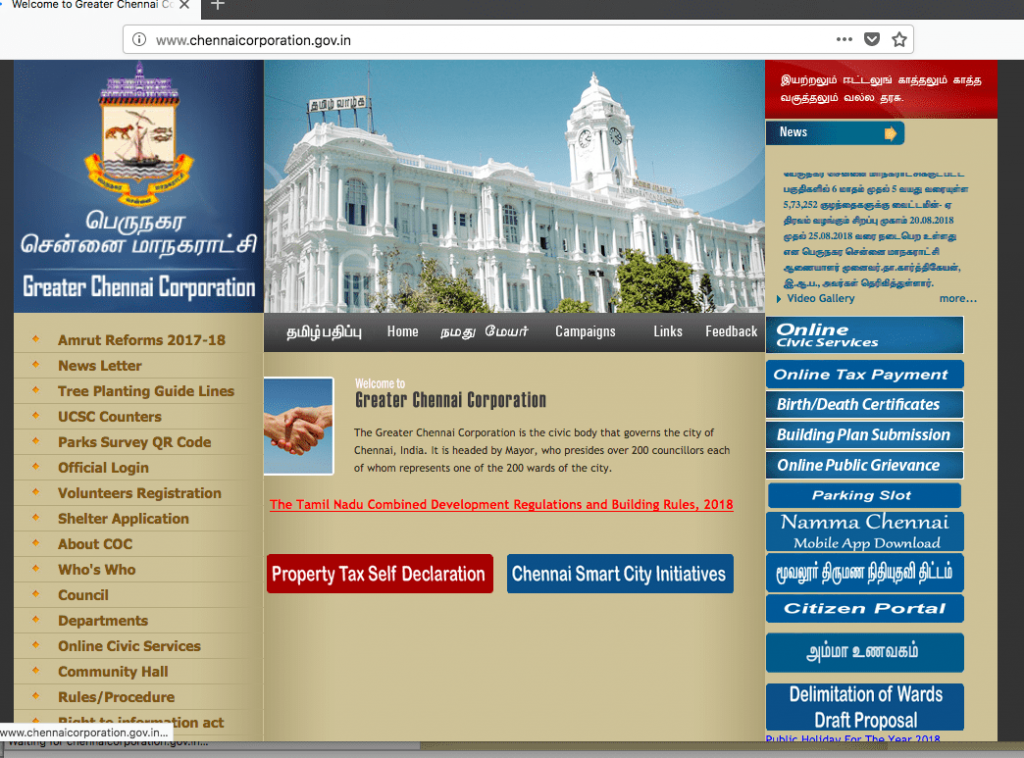Submission of self declaration forms for revised property tax has been in the news for more than a month now. Despite multiple reports and clarifications by the Greater Chennai Corporation (GCC) officials, there is still palpable uncertainty among citizens about the whole procedure.
In an earlier article on the topic, Citizen Matters Chennai had explained the nitty gritty of self declaration and the procedure to submit these forms. Since then, the last date for submission of forms, has been revised to September 16th. As several questions continued to pour in from our readers, we met R Lalitha, IAS, Deputy Commissioner, Revenue & Finance, Greater Chennai Corporation to seek some clarification on related issues.
Excerpts from the interview:
To start with the basics, what is the count of assessees in Chennai today?
Any citizen who has got her property registered is an assessee. Chennai with 44,000 residential and non residential streets has 12.14 lakh assesses, who have registered their property with the revenue department of Chennai Corporation. All of them should submit self declaration forms.
What is the self declaration form about?
The Tamil Nadu government has revised the property tax for Chennai after 20 years. According to the Chennai City Municipal Corporation Act (CCMC) act, it is mandatory to sensitise citizens about the revision and collect self declaration form from assessees before implementing any revision.
How many submissions has the department received so far? Is the department considering another extension of the deadline?
Of the 12.14 lakh assessees, around 6 lakh have submitted their self declaration forms to us. We are optimistic about receiving 8 lakh forms by September 16. Since the deadline has already been extended once — from August 31st to September 16th — we don’t want to do it again. However, revenue officers at the zonal level would personally measure the properties of those who did not submit the forms, for the assessment.
Why isn’t there an ‘edit’ option for assessees who may want to revise certain details in the self declaration?
Certain fields can be edited by the owner while submitting the self declaration form. However, important fields such as name and address cannot be changed, after submission. They can be rectified only by the revenue officials. Citizens can mail the corrections to adcrevenue@chennaicorporation.gov.in
What are the mandatory fields while submitting the self declaration forms?
Primary mobile number, name, address and declaration of the area.
A lot of citizens seem to be confused over the Undivided Share of Land (UDS). UDS is the part of the plot given to the owner of the flat in an apartment complex on which the entire structure is built. UDS data is collected for assessment but is not among the mandatory fields to be filled. If one doesn’t have/know the UDS, they can skip the field.
How can Non Resident Indians (NRIS) submit self declaration forms, since the mobile number criterion has no option for any other numbers except those that start with +91 (India country code)?
They can download the form from the Corporation Website, fill it and send us by email: adcrevenue@chennaicorporation.gov.in
How can new property owners, who have not yet received the property tax number, complete the process?
Assessees without property tax number cannot submit the self declaration forms. We have stopped giving the number to new assessees a month ago. Assessment of their property will be done after September 16th.
Declaration of area seems to be the most confusing for citizens…
Yes. Individual property owners should also add the additional area that includes sunshade and car parking to their built up area, floor by floor and declare in the table. The easiest way for apartment dwellers is to refer to their registration deed to see the area they have paid for. Such area generally includes plinth area of flat and the common areas, as the builder would have taken the additional area into consideration.
Can an owner with multiple properties submit the self declaration form with the same mobile number?
Yes, there is a procedure for different assessments to be done using the same mobile number. Once you verify your mobile number with an OTP, it takes you to a screen where all the properties with the same mobile number are listed, and you can choose the one you are filing the declaration for.
Is there a penalty for those who have understated their property in self-declaration forms?
No, there isn’t. But citizens should understand that the details of their property are already recorded online by the Corporation. If there is a variation between the data that we have and what citizens have submitted, the assistant revenue officers from the respective zones will manually measure the property. It would be added workload for the officers and an embarrassment for the owners.
Should owners with vacant plots pay property tax?
Yes, though it is called vacant land tax, and not property tax. Many vacant plot owners feel that they can get away with it. But, when they want to construct a building in the plot, the plan will not be approved unless they pay the arrear amounts. Isn’t it better to pay a meagre amount every year rather than shelling out a huge amount at once?
